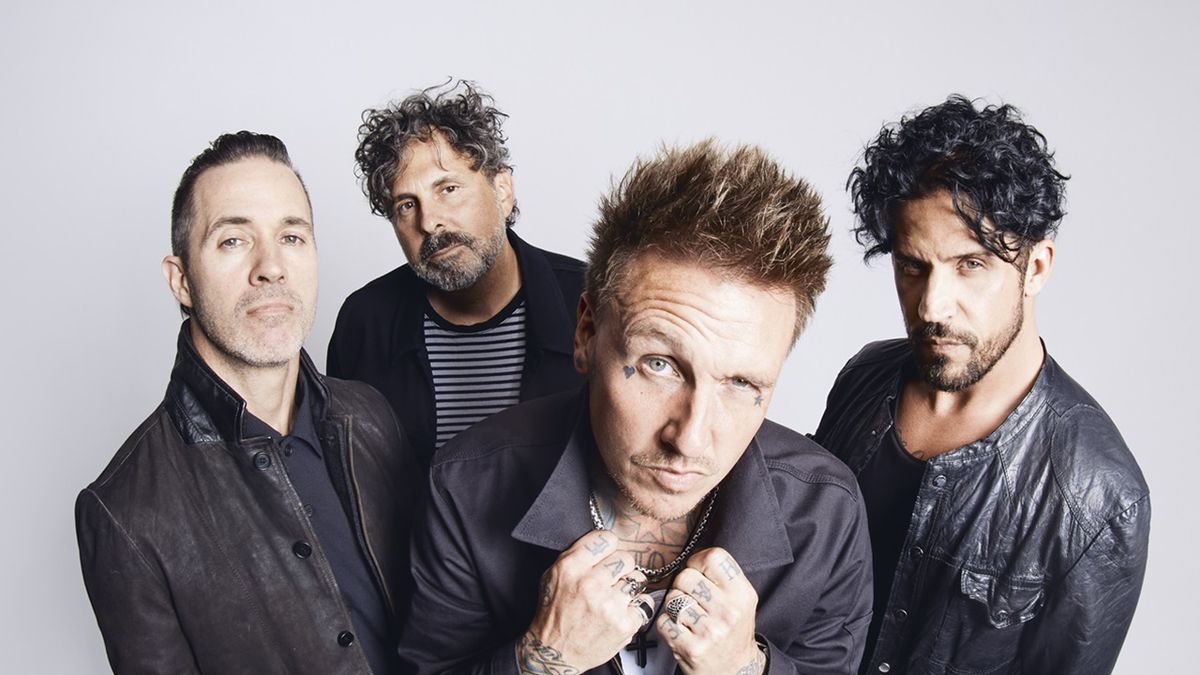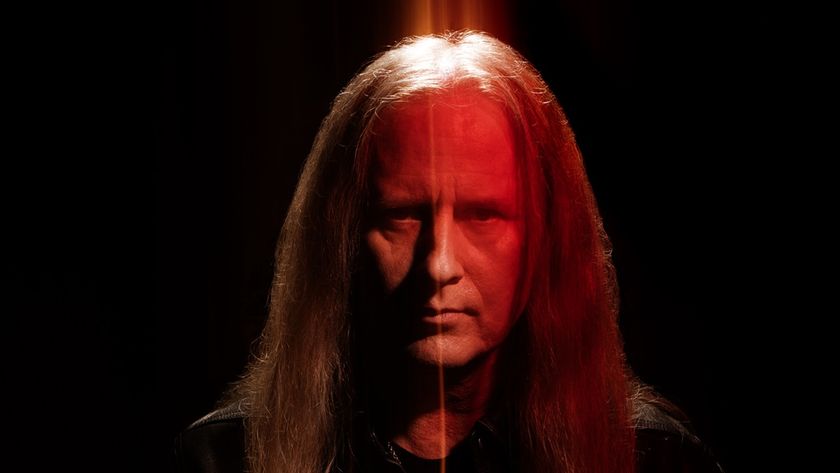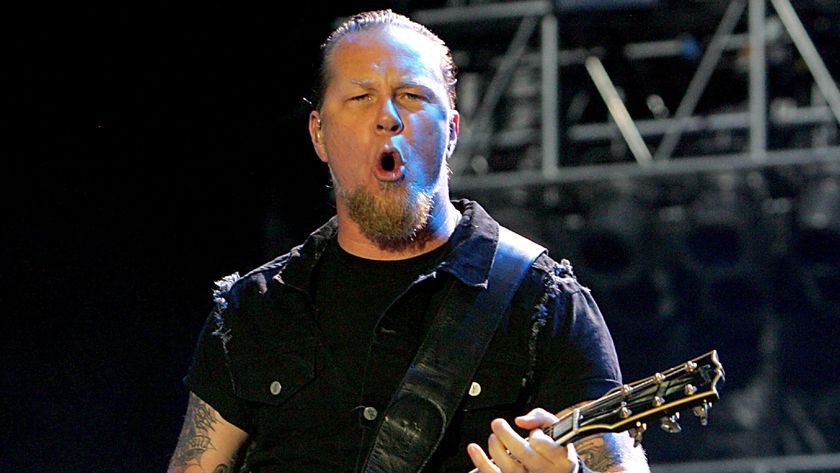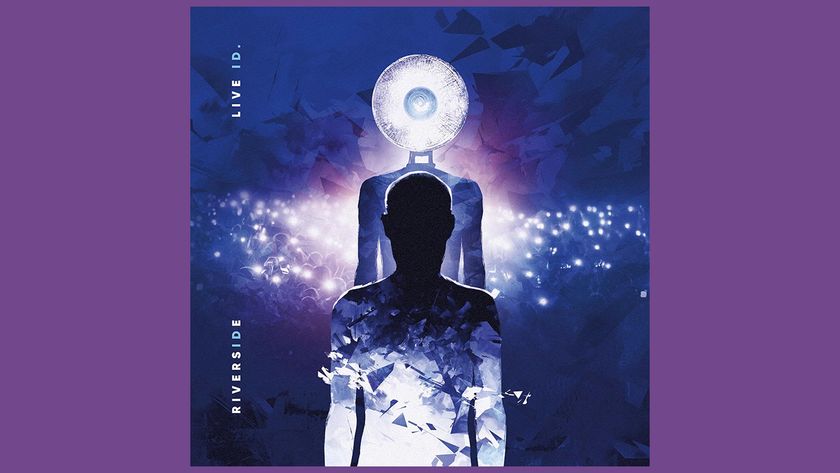"We’re in it now, dude!” says Jacoby Shaddix, happily walking along a Los Angeles sidewalk with a full plate of street tacos, a sugary Mexican bottle of Coke in his hand. He’s here with the rest of his band, Papa Roach, all of them celebrating the end of another work day with an impromptu meal.
A few minutes ago, Jacoby was just another customer in line for food, but then a little girl ahead of him looked up at the singer with the tall, spiky brown hair, the face tattoos and chains around his neck. She was with her family, and told her dad this guy behind them looked like a rock star. “Actually, that’s my gig,” Jacoby admitted, when asked by her astonished parents. “I sing for Papa Roach.”
The singer is in a good place tonight, still youthful at 48, as the band mingles with locals at this popular taco spot. Tomorrow, Papa Roach will be back in the studio to record an acoustic version of a new song yet to be revealed. Then for Jacoby it’s a quick flight back home to Sacramento to the wife and kids.
His craziest, most dangerous times are now well over a decade behind him, and the days when Papa Roach might have been dismissed as an MTV flash in the pan are a similarly faded memory. Almost a quarter-century after the band broke big with their multi-platinum second album, Infest, they are steadier than ever, with a multi-generational audience and full control of their destiny.
“I had a conversation with somebody,” says bassist Tobin Esperance. “They were like, ‘You know what your problem is? You guys just never went away.’”
Papa Roach have rarely succumbed to simple nostalgia, though they’ve continued playing the hits on the road, while producing an ongoing stream of new music over the years. However, 2025 will see them engaging with their past via with The Rise Of The Roach tour, a series of dates that marks the 25th anniversary of Infest, including a run of arena shows in the UK.
“I like to play the hits. I’m that guy in the band,” Jacoby says of marquee songs Last Resort, Broken Home and Between Angels And Insects, but he does appreciate the album’s deeper tracks such as Snakes and Binge, on which he can hear his early aspirations as a songwriter. Not every track got there.
“There’s a couple of moments where I feel like we totally fell short. But then, who am I to judge? It’s just a snapshot in time.” The Rise Of The Roach tour will include that snapshot, but the singer says it won’t be defined by it.
“It’s a cool way to celebrate the old, but it’s also about the new, and where we’re going,” he says. “We’re not the type of band that needs to just rely on the early tunes to connect with our fans. We’ve got 11 albums.”
A few hours before the tacos, Jacoby and Tobin plus guitarist Jerry Horton and drummer Tony Palermo (who joined in 2008, replacing original sticksman Dave Buckner) are in a Los Angeles photo studio, taking turns in front of the camera. A soundtrack drifting from Bob Marley to Billy Idol fills the air.
When Jacoby isn’t having his photo taken, he sits at the bar of the lounge. He mostly drinks flavoured sparkling water, though Tobin eventually brings him a fresh espresso in a paper cup. It’s the one substance that gets the singer going these days. “Oh, I love caffeine,” he says between sips. “That’s my drug of choice.”
By the time Infest was released in April 2000, Papa Roach had been a band for seven years. Forming in Vacaville, California, they self-released a pair of EPs (1994’s Potatoes For Christmas and the following year’s Caca Bonita) and a debut album (1997’s Old Friends From Young Years). They planned to slowly build up their audience through hard work on the road.
That changed with the runaway success of Infest, and especially its first single, Last Resort. The song found Jacoby singing and rapping lyrics of defiance and frustration: ‘I never realised I was spread too thin / ’Til it was too late and I was empty within / Hungry, feeding on chaos and livin’ in sin / Downward spiral, where do I begin?’
The song was an international hit and helped Infest sell more than three million copies within its first year alone. As it was happening, Papa Roach were on the road as the support act for Korn. Jerry Horton remembers Korn bassist Fieldy pulling them aside, not only to congratulate them, but to make sure they understood that this kind of success represents a great moment, not the way things will always be.
“Fieldy said, ‘Look man, how this is happening for you guys is not normal,’” Jerry recalls. “‘You’re going to think that it’s going to always be this way, but it’s not.’ That was kind of a wake-up call. It wasn’t until the end of that cycle where we were able to take stock of everything that happened. I think it messed with our heads, because we were so far into it that we didn’t even realise what was happening until after.”
At least he heard the warning, unlike Jacoby. “I was on my own trip, marching to the beat of my own drum,” he recalls now. “I had it all figured out, and I soon found out that I didn’t have it all figured out.”
It was an era when a metal band could play Ozzfest and also MTV’s pop countdown show TRL (Total Request Live), appealing to both metal fans and pop kids. It was during a stop on TRL that the band met up with pop superstar Justin Timberlake, then a member of million-selling boy band NSYNC.
“Justin pulled up on us and he’s like, ‘What’s up guys?’” Jacoby remembers. “Part of me is like, ‘Oh, these are the fuckin’ pop guys. Fuck them.’ And they were just cool as fuck. He looked at me, and he’s all, ‘This like the WWE, dude. We’re musicians, you’re musicians. We’re out here chasing our dream, you’re chasing your dream.’ And I was like, ‘You’re right, dude.’”
Papa Roach’s success hit as nu metal neared its peak. It had been brewing since the release of Korn’s self-titled debut album in 1994, gathering pace throughout the decade thanks to the subsequent success of Limp Bizkit, System Of A Down and Korn themselves. The young Jacoby had connected with the movement instantly.
“It was an amalgamation of all the things that I was loving simultaneously smashed together,” he says. “Whether the critics thought it was cool or not, we were on a wave that hadn’t been ridden before. This is uncharted territory, let’s keep going.”
Still, Papa Roach became concerned about being identified exclusively with that movement. Jacoby is certainly aware that not everyone loved his band because of it. “I’m sure there’s a million metalheads that think my band is trash, and that’s fine,” he adds.
“If I read all the message boards and really dove into all of that, it would hurt my heart. But at the end of the day, I can look at myself in the mirror and be proud of the creator I am, the man that I am, the musician. I’m proud of our story and our walk, but the rock and metal community, man, there’s something powerful in it. It’s an inclusive culture. It’s freaks, geeks and weirdos – come as you are. Kurt Cobain was saying that back in the day: ‘Come as you are.’”
More than two decades on from that heyday, a nu metal renaissance is in full swing. Many of the bands who helped turn the scene into such a huge cultural force first time around are still here. According to Jacoby, there’s a residual camaraderie between them.
“When we see each other out in the world, it’s brothers – it’s, like, we’ve survived the era,” he says. “We have lost friends, to ODs, suicide. And we see each other out there still holding it down.”

There were times when it looked like Papa Roach themselves might not survive the era. As the Infest tour rolled on, Jacoby lost control of his partying. That began to show itself during the making of the follow-up to Infest, 2002’s Lovehatetragedy. His drink of choice was straight vodka and he liked it a lot.
“I wasn’t as sharp as I could be,” he says. “When we wrote Infest, I was like a laser. And then when we wrote Lovehatetragedy, I was blurry. I was drinking every day.”
At the same time, he and the band still had creative aspirations. They ignored advice to write 12 more songs exactly like Last Resort. Jacoby stopped rapping, determined to prove himself as a rock singer. But Lovehatetragedy sold only 500,000 copies in the US, a disappointment compared to Infest. After rocketing up to the stratosphere, Papa Roach had come crashing back to Earth.
As Papa Roach got to work on their fourth album, Getting Away with Murder, the partying only accelerated for Jacoby. He made an attempt at sobering up, or at least slowing down.
“I found myself calling a friend, going, ‘Dude, I need help. I gotta get cleaned up’,” he says. “I was a fucking wreck. I don’t want to fuck my shot up here. Not that I don’t want to be who I am, but I want to be the sharpened, refined version of this band.”
Matters weren’t helped by pushback from people around them. They’d written a yearning, melodic ballad titled Scars, but neither Getting Away With Murder’s producer Howard Benson nor their label were impressed with it. The band were pressured into re-recording it so it sounded closer to Staind’s brooding, heavier It’s Been Awhile.
That version was never released in the end, but it suggested that confidence in Papa Roach was ebbing. When their label, DreamWorks, was sold to Universal, Papa Roach were moved to Geffen. According to Jacoby, when Geffen’s president, Jordan Schur, was handed a pre-release copy of Getting Away With Murder, he threw it against a wall, yelling: “What the fuck am I gonna do with this dead band?”
His view of Papa Roach may have been harsh, but it wasn’t unfounded. By 2004, the nu metal bubble had burst, its profile overshadowed by garage rock bands such as The White Stripes and The Strokes. This much was evident on tour. When Papa Roach played The Double Door in Chicago in July 2004, a month before Getting Away With Murder was released, fewer than 200 people showed up.
“We got back on the bus after that and we were like, ‘Whoa, is this over?’” Jacoby recalls of the dismal turnout. “I’m like, ‘No! I cannot go back to stripping and waxing floors.’”
What followed was unexpected. That November, Scars dropped as the album’s second single and caught fire. Not just with existing fans, either – the song peaked at No.15 on the Billboard Hot 100. If the early 2000s had seen shows like TRL leaning towards rock, this was Papa Roach leaning towards pop, experimenting with a more melodic sound. It had paid off.
Flush with the success of Scars, Geffen threw their weight fully behind the band. Papa Roach persuaded the label to rent the Paramour Estate, an elegant Spanish Mediterranean mansion built in 1923 and located in LA’s hip Silver Lake district.
“We got to live out our Led Zeppelin dreams,” recalls Jerry of the album they made there, 2006’s The Paramour Sessions. “That was a crazy time, because we were coming right off of that high again. It was a lot of fun.”
The Paramour Sessions was their last album with Dave Buckner. The drummer was having his own issues with substances, and checked into rehab in 2007. He was temporarily replaced by Tony Palermo, but in early 2008 it was revealed that Buckner wasn’t returning. He sued the band, claiming he hadn’t received his full share of earnings (the lawsuit was settled in 2009).
Any lingering acrimony has since been resolved. Dave rejoined his old bandmates at Aftershock festival in 2013 to play Last Resort. Earlier this year, he reunited with Papa Roach again, this time on US TV game show Family Feud, where they faced off against the band Daughtry. Papa Roach won, though both teams pledged their winnings to the American Foundation For Suicide Prevention.
“We’re actually super-close friends again,” Jacoby says. “It’s been really healing through the last 10 years of he and I building a relationship back together.”
The healing of the singer himself didn’t occur until the making of 2012’s The Connection. At first, he was still locked into a life of boozing and pills, which fuelled serious depression when he came back down.
“I was the life of the party until the party was over,” Jacoby explains. “Then I was alone at the end of the night and crying in the fucking bus going, ‘Band meeting! We gotta have a band meeting!’ I had a flair for the dramatic and the over-emotional.”
The first half of The Connection was made while Jacoby was still abusing himself. Then halfway through, he experienced a revelation and stopped. He hasn’t had a drink since. “I just struggled off and on for so long, mental health-wise, depression, anxiety, alcoholism, addiction,” he says. “It was intermittent 2004 to 2012. It was sober for a bit, off the wagon for a bit, sober for a bit, off the wagon for a few days. It progressively just got gnarly until The Connection.
“Booze – there is a demon in there that wants me dead, and I refuse to allow that to be the thing that will chip away at my spirit. I’m free from it. I never have the urge. I can go into a bar and people are drinking, and I’m having a good time.”
The band never came close to breaking up because of their frontman’s bad habits, in part because he always showed up for the gig. But there were definitely plans for an intervention more than once.
“We probably wouldn’t even be a band right now if Coby hadn’t gotten sober,” Tony Palermo admits.
“He’s still loud and obnoxious without it,” offers Tobin. “So it’s kind of cool that he’s still himself. It’s just a way better version.”
Before I Die, a song on The Connection, describes a turning point for Jacoby. In 2012, his high school girlfriend-turned-wife, Kelly, kicked him out of their home, tired of his boozing and his lifestyle, leaving him contemplating suicide. ‘Maybe I pushed you way too far / To pull you back from where you are / But if I can, I swear that I / Will live for you before I die,’ he sings on the track, a man lost in personal darkness, looking for a light.
“I wanted this version of myself to die,” Jacoby says quietly. “I wanted to physically die. That was rock bottom for me. My wife, my kids are in our house, and I’m over living at my brother’s in a little 10-by-10 room.”
In the same song, Jacoby sings: ‘Begging on my knees / Is there a god to save me?’ Today a small cross hangs around his neck. It’s not some heavy metal affectation, like the crucifix he got tattooed on his arm two decades ago. In the midst of his self-destructive behaviour, he turned to Christianity.
Prior to that, he’d sought spiritual direction through Eastern mysticism, Buddhism, Taoism and Stoicism, some of which he still carries with him today. Religion, he says, helped him get sober back then, and helps keep him sober today. He kisses the cross, and his voice gets shaky.
“It’s restored my family,” he says. “That’s the heavy stuff. I’m learning to treat myself better. And the disciplines and obedience that I implement into my life only yield positive things. I’m like, I gotta keep pressing in on this. I started on that walk 12 years ago and it’s something that’s grown and evolved.”
He and Kelly managed to salvage their relationship – they’ve been married for 27 years. Jacoby jokes that their longevity comes from simply never wanting to get divorced at the same time.
“She’s been a rock, man,” he says. “She’s the person that sees the good in me when I don’t see the good in me. I’m so grateful for that woman. And she’s a great mother. She’s a great friend.” He sniffs back a tear. “Man, I’m getting emotional talking about this woman!”
Just as important to Jacoby as the survival of his marriage is the survival of Papa Roach themselves. The era of big label deals are long gone. Their most recent album, 2022’s Ego Trip, represented a new era for them, as owners of their own indie imprint: New Noize Records.
The timing was good. Nu metal has come back and the band have learned to embrace the category. They’ll be celebrating Infest on these upcoming UK dates.
“We are a few tickets away from selling out Wembley Arena – we’ve never sold out Wembley Arena once in our career,” says Jacoby. “We just added two more shows in the UK because it’s popping.”
Proving their continued success is no fluke, they notched up another hit earlier this year with a new version of Ego Trip song Leave A Light On (Talk Away The Dark), reworked as a duet between Jacoby and country-pop star Carrie Underwood. The track found the vocalists trading verses, singing of finding hope amid despair: ‘It’s not like me to worry / But when I see you fading in the dark / I’ll leave a light on for you.’
Proceeds from the song once again went to the American Foundation For Suicide Prevention. “It’s always been: Let me take this pain and funnel it into something that feels purposeful and purpose-driven,” says Jacoby. “And that story is the story that connects me with my brothers in the band, with the man on the street, with the lady on the street, that connects with our music. That’s the through line – pain to purpose.”
Papa Roach's UK tour starts February 7 at Wembley Arena. For the full list of tour dates visit their official website.






